
How to Get Interviewed on Podcasts by Writing the Perfect Pitch
Landing interviews on other podcasts is the number one way to grow your own show and establish yourself as an industry expert.
Getting featured as a guest on someone else’s podcast is a free way to tap into an audience of thousands of people interested in your topic. Interviewing on other podcasts in your industry is an effective and relatively fast way to get your message into the ears of a new audience.
But getting booked on shows that are worth your time takes a knowledge of the process and a little investigating.
So, why should you want to get booked on shows in the first place?
The benefits of being interviewed on podcasts
While bloggers scramble to get the internet’s attention for just a few minutes, podcast listeners consume roughly seven hours of content a week and listen to entire episodes 80% of the time.
What does that mean for you? Getting a podcast interview is an effective strategy of growing your show, brand, or business.
Podcasters always want to know the best way to market their show and expand its reach, and there’s no better way to do this than by targeting engaged listeners who are interested in your topic.
"Guesting" within your field of expertise is a powerful, free marketing strategy that can reap big dividends for your show.
Getting booked on the right podcast can have dramatic effects on your website traffic, show downloads, business or brand, and the benefits reaps rewards that can last long past the time the episode airs.
Like any marketing method, seeing significant, consistent results will take time, but if you pick the right shows, you could begin to see results as soon as your very first interview.
Getting interviewed on podcasts can:
Increase traffic to your website and podcast:
Getting on the right podcast means you get exposure to hundreds (possibly thousands) of people interested in your topic — this is the kind of exposure you want.
You cannot only mention your website on the podcast, but your episode will likely be featured on the podcast host's website and in the show notes section.
Link shares from reliable sources boost SEO, lead the right kind of people to your website and podcast, and act as social proof that you're an authority on your topic.
Build your reputation as a valuable resource:
If people trust you, you're more likely to buy your book, subscribe to your show, or book your services. Getting interviewed on the right podcast serves as social proof that you're worth trusting.
Podcast listeners grow to trust the recommendation of show hosts. If their favorite show features you in an episode, they’re likely to see you as a valuable resource
The kind of podcasts to look for
You’ve decided to try to get booked for a guest interview, but where do you start?
It’s important to find podcasts with an audience similar to your own that would be interested in what you have to say.
From there, put together a list of 30-40 + prospective podcasts.
Let’s break down the process of finding a podcast that meets the most important criteria, so you don’t waste your time!
1. Find out what podcasts your audience is listening to
When trying to get booked as a guest on a podcast, it’s important to know the other shows in your own podcast’s category and the ones suggested to your listeners.
To see what shows your listeners might be tuning into, open Apple Podcasts (formerly iTunes) and enter the name of your own show (you can also use directories like Stitcher or Google Podcasts).
Scroll down to “You Might Also Like” to see the top 15 related podcasts in your category.
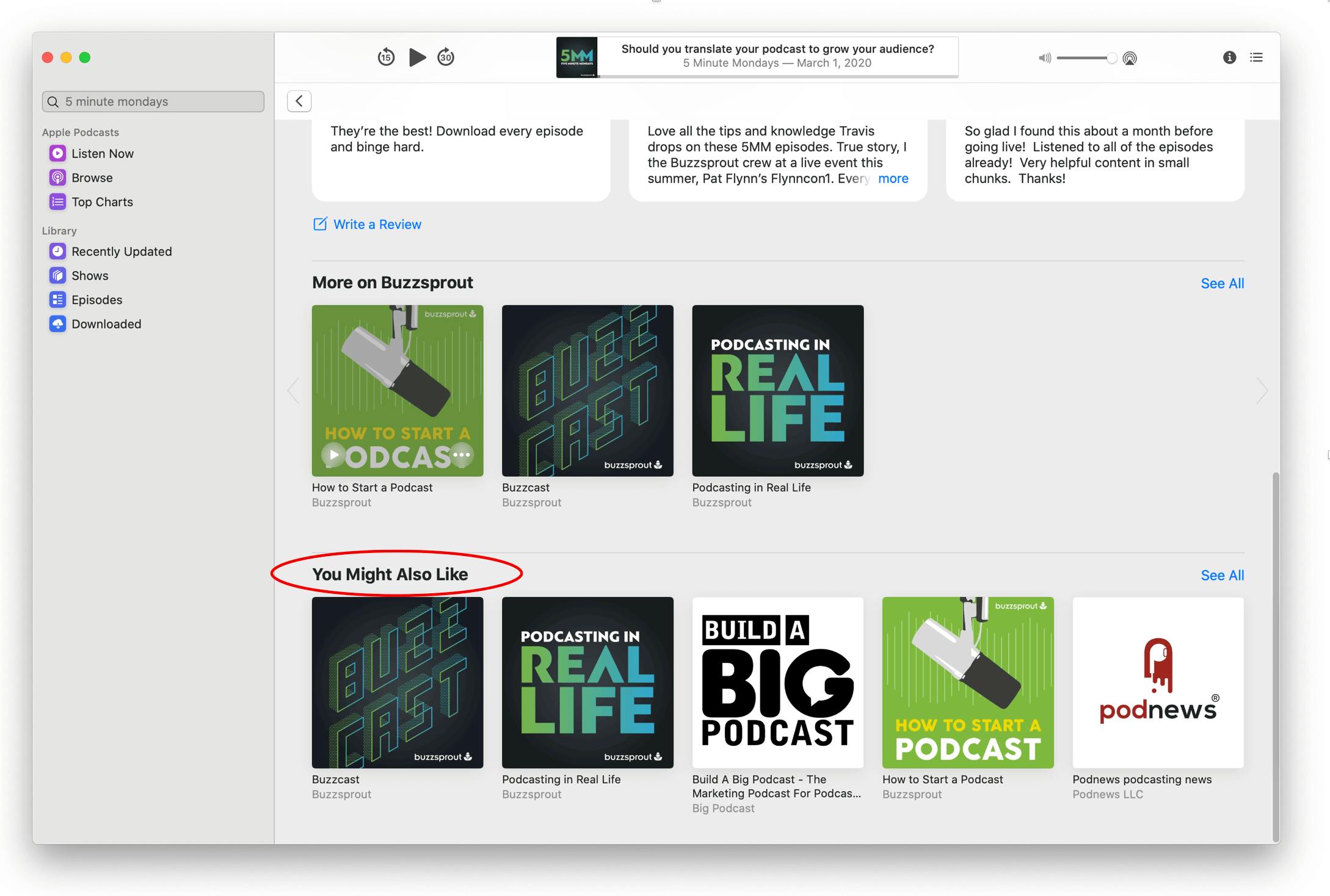
These 15 podcasts are related to your podcast's topic and give you a strong starting point when looking for a show with an audience interested in what you have to say.
Pro tip: Don’t pitch to the top podcasts or new podcasts featured on "New and Noteworthy" right away. Especially if it's your first time pitching, focus on subcategories, and look for shows that appear to have a decent following but are accessible and still open to hearing pitches from newer podcasters.
To find podcasts within a subcategory, go to the main category page, and select a topic. After you choose a category, Apple Podcasts will show you the subcategories for the topic you selected.
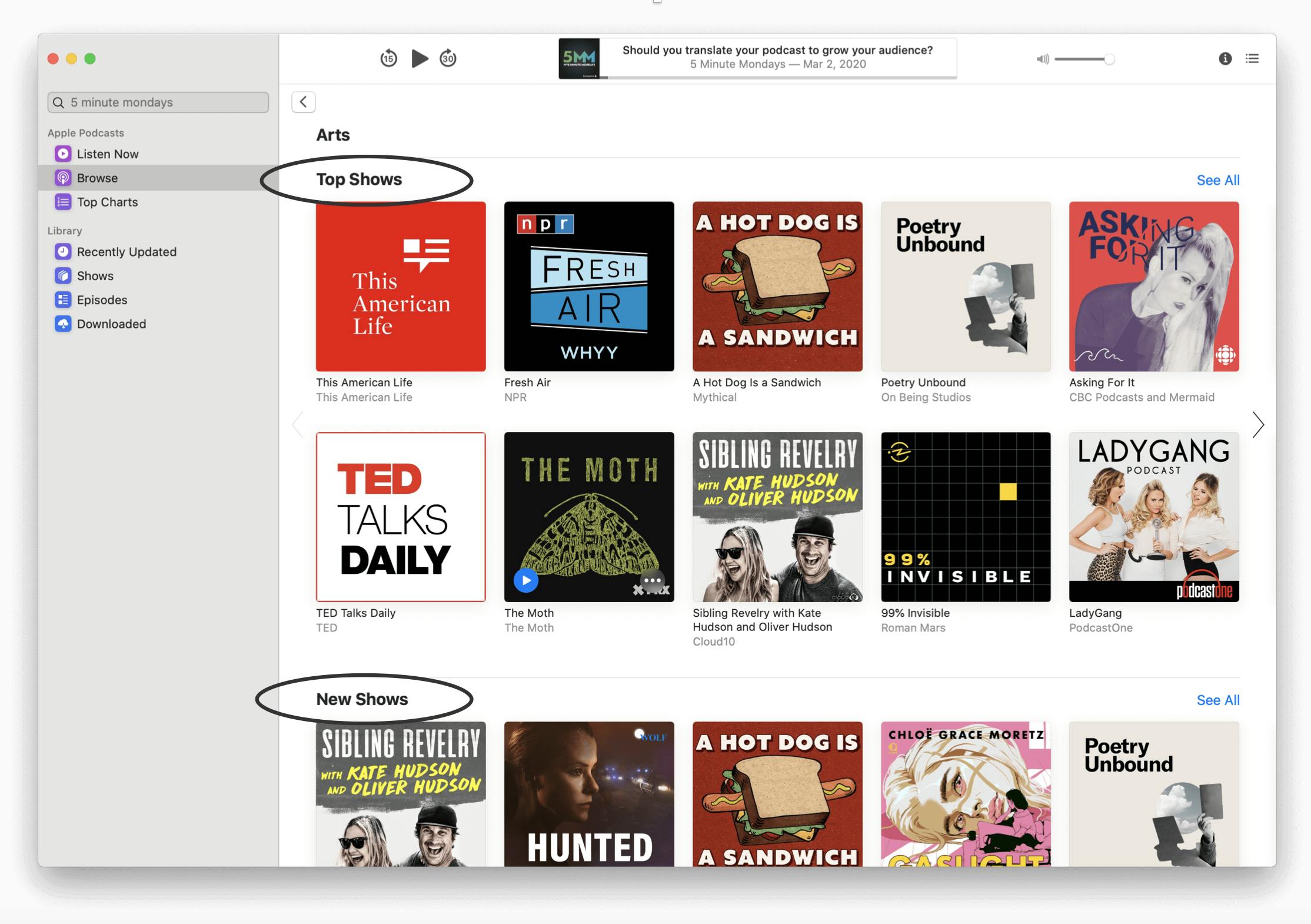
Alternative: Use Podchaser to Research Categories & Rankings
No matter what platform you’re on, you can also use Podchaser to find “similar podcasts” or browse their categories section. Podchaser has some categories that Apple Podcasts does not, so it may be easier to find shows in your niche.
You can also verify that the podcast you're pitching actually accepts guests. You don't want to waste your time pitching to podcasts that only interview specific guests.
Optimally, you'd listen to a few episodes before you pitch a podcast, but you can start by verifying that guests have appeared on the show in Podchaser. Just find the show you're looking for in Podchaser, scroll down to the Creators & Guests section to see if other people have made appearances on the podcast.
2. Is it a quality podcast? Assess web presence & following
Ideally, you would be able to scroll through Apple Podcasts and see how many listeners a show has at a glance.
Unfortunately, podcast stats don’t work that way, so you have to look for other clues that indicate a show’s success to determine whether a podcast is worth your time.
While scrolling through shows, look for podcasts with quality artwork that is well-done and professional. Make sure the show has at least 5-10 positive reviews and a rating of 4-5 stars.
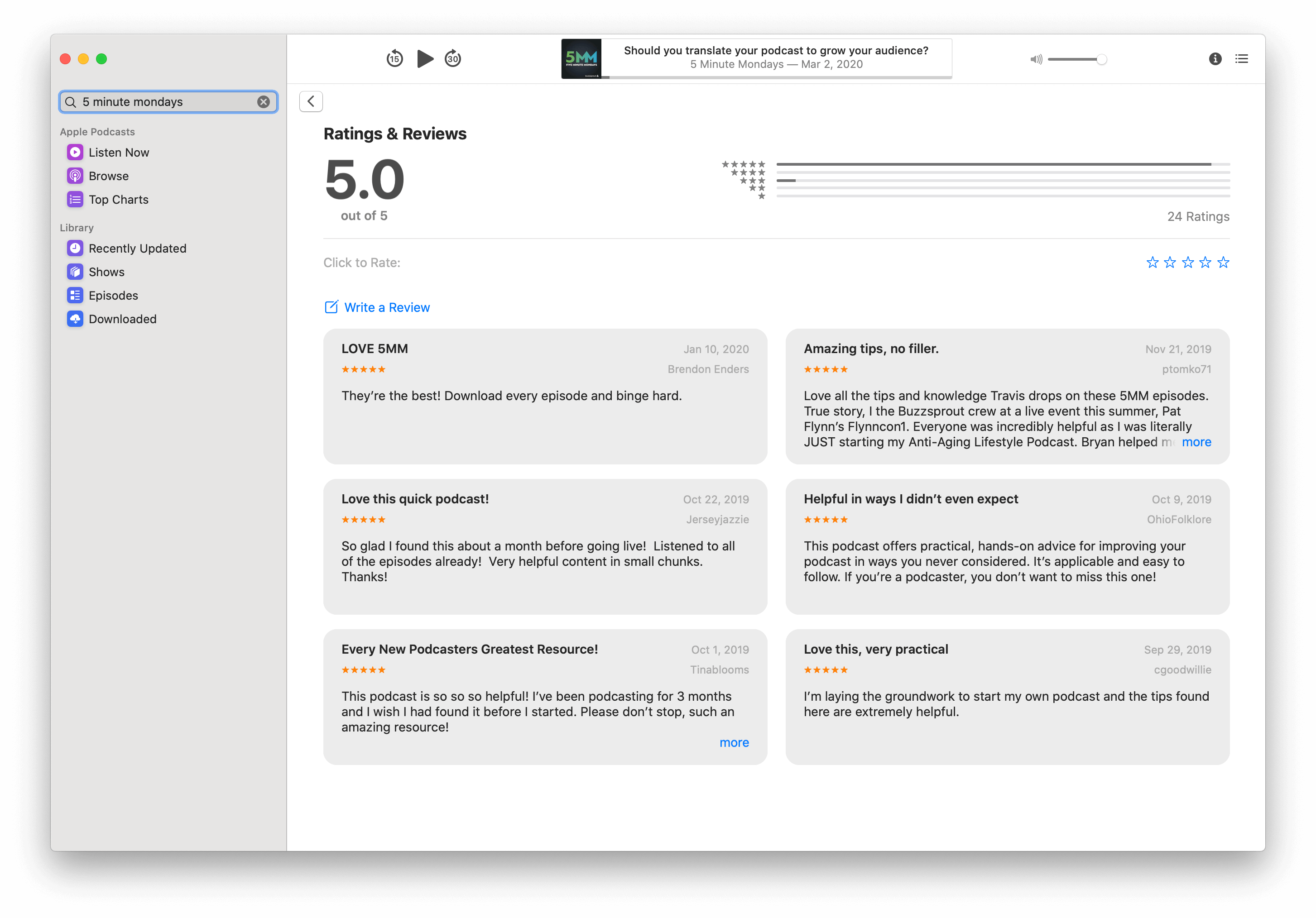
Next, look up the show’s host or influencer, and the podcast itself, on social media.
Look for podcasts with a dedicated social media account — stay clear of personal accounts who only mention their show every so often.
Does the host have a decent amount of followers and a strong social media presence? Quality content, consistent posts, and engaged followers are a good indication that the host has an active following, and probably regular podcast listeners, too.
You can also do a quick Google search for podcasts in your category since Google now shows podcasts in search engine results.
3. Get contact information
The best way to communicate with a podcast host is via email, message on social media, or a website contact form. You can often find a podcaster’s email address on their YouTube channel or a personal Facebook profile.
Add the host's name and email address to the list of podcasts you want to pitch to.
If you can’t find an email address, or would rather reach out via social media, you can use the following platforms:
- Facebook page (dedicated accounts only)
- Patreon Page
Now that you know how to get in touch with a podcast host, it’s time to craft a persuasive pitch to convince the host to have you on an episode!
Get in touch: Pitch your idea
“You need to create a "one-sheet" before pitching yourself to podcasts. A one-sheet is a one-page marketing pitch about you. Explain your expertise, awards, previous media appearances, and, most importantly, how you can help a podcaster and their audience.”
— Andrew from Podcast Guests
Persuasively pitching an idea is a craft. Successful pitches master the art of selling yourself without sounding sales-y and make it clear to the host why they should have you on their show and the value you will bring them.
Pro tip: Listen to an episode or two of a podcast before pitching to make sure the host has interviewed guests in the past.
Follow these three steps to increase your email's chances of getting a response.
1. Craft a strong subject line
If you’re writing an email, make sure your subject line is clear, specific, and short. People mostly read emails on their smartphones, so you want to make sure the entire subject line is readable even on a mobile device.
2. Nail the introduction
The first few sentences of your message are your chance to distinguish yourself from spammers and make a solid first impression that will keep your email from being deleted.
- Introduce yourself and the name of your podcast
- Explain how you heard about the host and what you appreciate about their show
- Keep the introduction to no more than three sentences
- Make it clear how you stand out within your field of expertise
- Include links to your podcast and/or press kit (if you have one)
3. Make the ask
Before you ask to be on a show, get clear on the value you will bring to the host and their audience. What’s in it for them?
Take some of the work out the process for the host by clarifying why you would be a valuable guest and what, specifically, you would like discuss.
If you take the time to explain how the host could incorporate you into the show, they won’t have to figure out an angle for how to include you in an episode. The easier you make it on the host, the more likely they will have you on their podcast.
If you've already been interviewed on podcast episodes, include a link to your Podchaser creator profile so they can validate who you are and see your other interviews.
Example pitch template:
Subject line: Keep it short, simple and to the point. Include words like “opportunity”, “partner” or “support” to make it clear you want to help them out, too.
Body:
Hey ________,
My name is ___________. I host the podcast _______________ . Include your expertise, including any awards or achievements, here. Let them know you've listened to their show and tell them what you appreciate about it.
“I'm contacting you because...” Are you promoting a book? Do you have something to say about a recent event within your industry? Are you trying to raise awareness about a cause, or do you just want to get the word out about your show?
"Here’s an idea for a show that I came up with for your audience:"
Tell them what you would like to talk about and how the host could include you and your topic in an episode. Below you’ll give a bullet-pointed outline expounding on your subject matter.
- Subject you want to talk about — The title of your book, your podcast, or the topic you want to discuss. Why is this a valuable topic?
- Supporting point #1
- Supporting Point #2
- Supporting Point #3
Closing: Thank them for their time, and let them know you’ve attached some information on your podcast/website/book/other resources below.
Your name
What if they say no? How to handle objections
Even if you perfectly craft your pitch, you’re still going to experience objections. The good news is, most of the objections you'll hear are ones you can predict and prepare for ahead of time.
Handling these common objections well is essential to building a good relationship with podcasters in your industry and keeps the door open for the possibility of being on their show in the future.
Objection #1 - “It will be difficult finding a time that will work for both of us.”
Be flexible to the host’s schedule and offer to change your schedule to do whatever is most convenient for them.
It will also benefit you to have a basic knowledge of the different ways to record a remote interview — it’s much easier on everyone’s busy schedules to have a remote interview than finding time to meet in person.
The simpler you can make the interviewing process for the host, the better.
Objection #2 - “I don’t think you’re the right fit for my show.”
To handle this objection, make sure you have a thorough understanding of the podcast you’re pitching to so you can make your topic as relevant as possible to their existing content and audience.
To lessen their doubt about whether to have you on the show, send them one of your podcast episodes your podcast episodes discussing the topic you're pitching.
Objection #3 - “What’s in it for me?”
While they might not say these exact words, you can be sure they’re thinking it. What can you do to help promote their podcast and thank them for featuring you on an episode?
Let them know you’ll promote the episode after it airs with a link to their podcast on your social media channels. You can also offer to leave their show glowing review in Apple Podcasts.
This kind of cross-promotion is key to podcasting success and promotes a good relationship where both parties benefit from the interview.
The follow-up
If you haven’t heard back within a week or so of reaching out, follow up with a simple, friendly email. Ask the host if they received your first email and include the link to your show again, so they don’t have to search for it in your previous message.
If you still don’t hear back, let it go! Sometimes podcasters just aren’t interested at the time or have already booked guests months in advance.
Don’t burn any bridges; you never know when they might reach out to you.
They said yes! What you need to know
Once a podcaster agrees to have you on their show, there a couple of important questions to ask:
When will the interview take place?
Once you secure an interview, you can use Calendly or ScheduleOnce to make the scheduling process easier and avoid confusion due to time-zones or miscommunications. The last thing you want is to get an interview and have a miscommunication about when it is!
Clarify how long the interview process usually takes so you can block off the right amount of time and prepare enough content for the interview duration.
Will the interview be remote or in-person?
More than likely, the interview will be remote and take place over Skype or another long-distance interviewing platform.
Make sure to clarify what kind of software the host plans to use so you can create an account for that platform (if you don’t already have one) and quickly hop on the call the day of the interview.
When is the episode set to air?
Know when your episode is set to air so you can structure your promotional efforts around the date.
Who is the host’s target audience?
Knowing the podcast’s target audience is important when you craft the content of the interview. Make sure you know who you’re speaking to and tailor your content to fit.
Pro tip: Listen to the podcast host’s previous guest interviews to get familiar with their style and know what to expect.
Day-of preparation
A little preparation will go a long way toward making your interview valuable to listeners and something the host is proud to feature on their show.
Remember, the podcast host doesn't have to use your interview, so don't slack off, thinking you have it in the bag! Make sure you focus on delivering quality content that is worthwhile to their audience.
- Prepare notes: Make a list of notes or bullet points, so you don’t forget key points you want to mention. Know the topic you plan to discuss as thoroughly as possible and think through questions the host might ask so you aren’t caught off-guard.
- Be on time: Get ready for the interview at least ten minutes early to allow time for technical issues, problems signing into recording platforms, etc.
- Have the right equipment: Make sure to have an external mic and headphones to monitor your mic technique. Don’t use your computer microphone or the microphone built into your phone.
During the interview:
You’ve done a lot to get to this point, so make sure to keep these things in mind, so you deliver robust and usable content for the host.
- Do an audio check: Ask if your audio sounds good on their end before they start recording and make adjustments as needed
- Respect time limit: Try not to exceed the duration the host set for the interview, and be conscious of their time.
- Teach, don't sell: Make it your goal to give away valuable, free information and help listeners, so they leave thinking if their free content is this good, how good must their product or service be?
- Include a CTA: If you’re selling or promoting something, mention them at the end of the show as a call-to-action.
- Do a give-away (a.k.a. lead magnet): Offering listeners a free guide or list is a great way to earn their trust, showcase your expertise, and grow your email list.
- Share your website and social media: Give the listeners a couple of quick ways to get in touch with you and learn more about you and your show or service.
Promote your podcast episode
After the interview, ask the podcaster when the episode will air; once the episode is released, it’s time to promote it!
After the episode airs:
Interact with listeners on the show’s social media:
Engage with the host's audience after the show is released to answer the listener's questions about your episode.
Share posts on your social media:
Post a link to the episode featuring your interview and include a quality image of the episode or show art.
Update your Podchaser creator profile:
After your guest appearance, add your credit to that episode on Podchaser so you can show off your interview and keep track of where you’ve appeared for future pitches.
Mention the episode on your podcast:
To boost traffic to the episode, mention the recent interview on your own podcast and link it to the episode in your show notes.
This kind of cross-promotion helps out the podcaster who interviewed you and is a great way to show your appreciation.
Use professional services to make connections
If finding and booking your own interviews seems like a lot of work, consider looking into booking services to do the work for you.
These services can be an investment but will relieve you of the leg work that goes into booking a guest interview.
1. Podchaser Connect
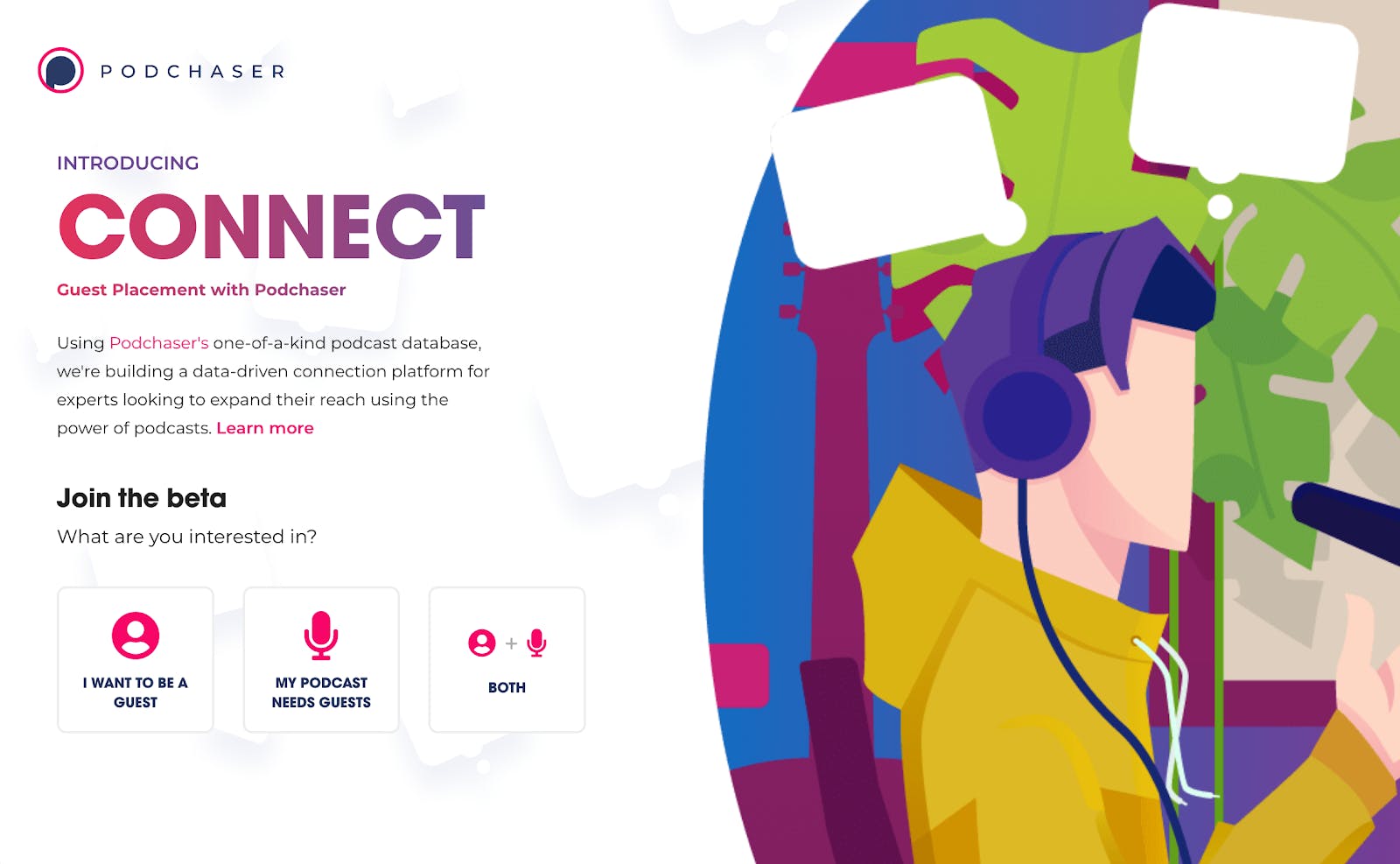
Podchaser recently released its new guest placement service called Connect, leveraging their massive podcast database of almost 5 million podcast credits.
The service takes a data-driven approach to strategically match guests and podcasts. You can go to podchaser.com/connect and sign up to connect with podcasts as a guest or as a podcast looking for guests.
2. PodcastGuests
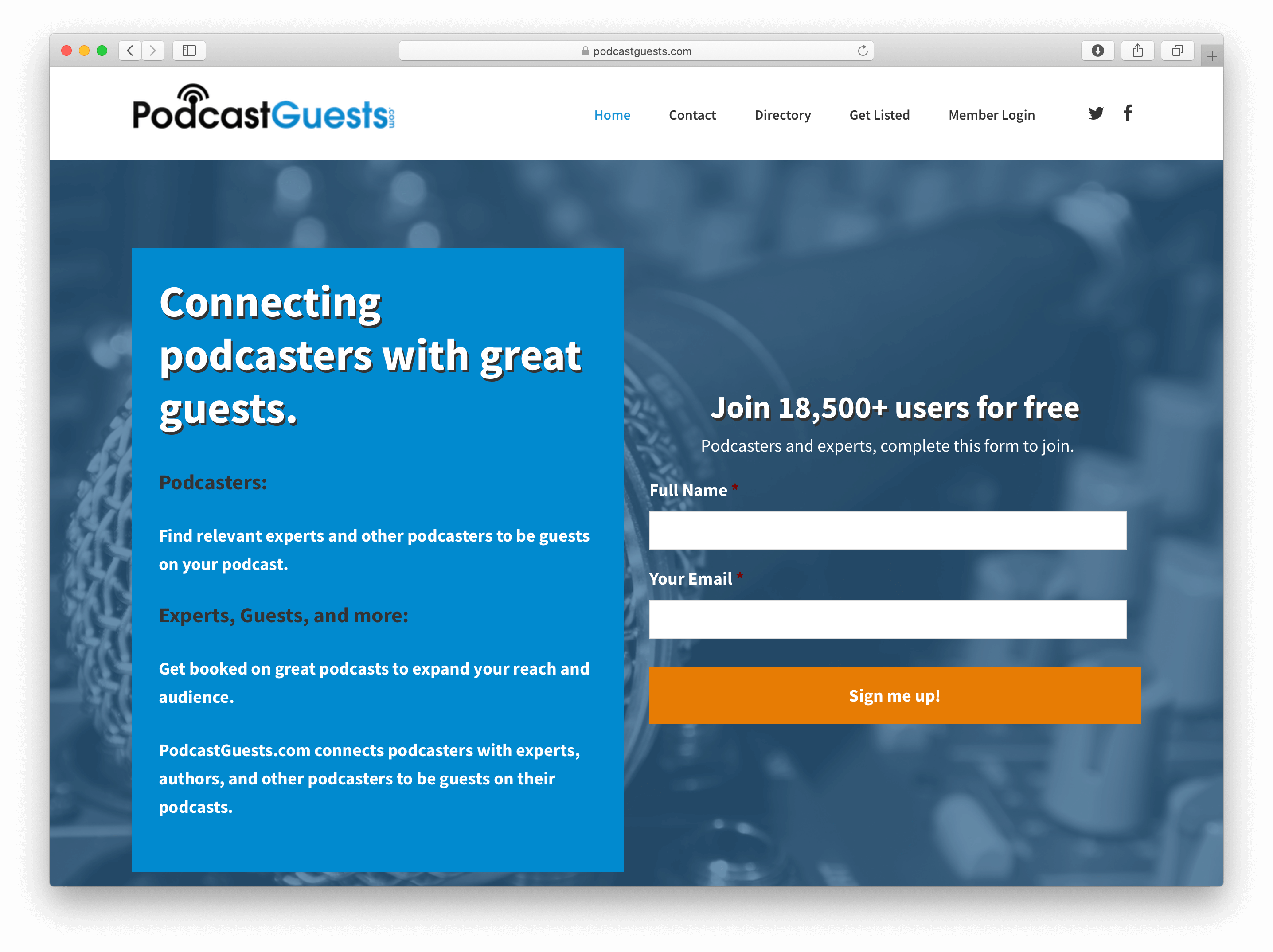
Cost: Starts at $9/month
Features:
- A profile featuring information about you and your podcast
- Access to other podcasters looking to connect
- Ability to send messages to and receive messages from other podcasters
3. Expert Bookers
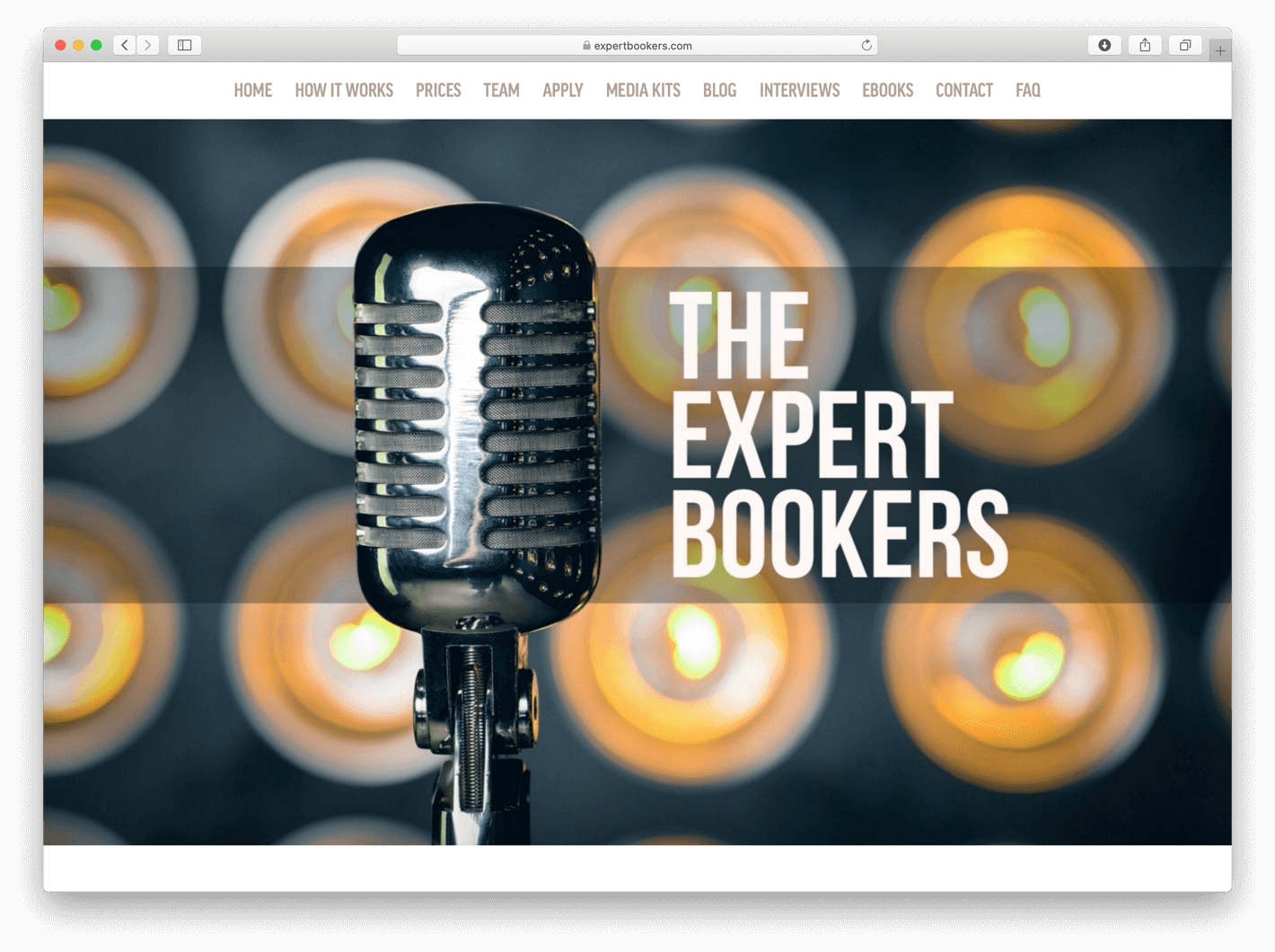
Cost: Starts at $499/month
Features:
- Your own personal account manager (like a talent agent for podcasting!)
- Podcasting scouting services so you get booked on the right shows for you
- All communication and scheduling handled by third-party leading up to the interview
4. Interview Valet
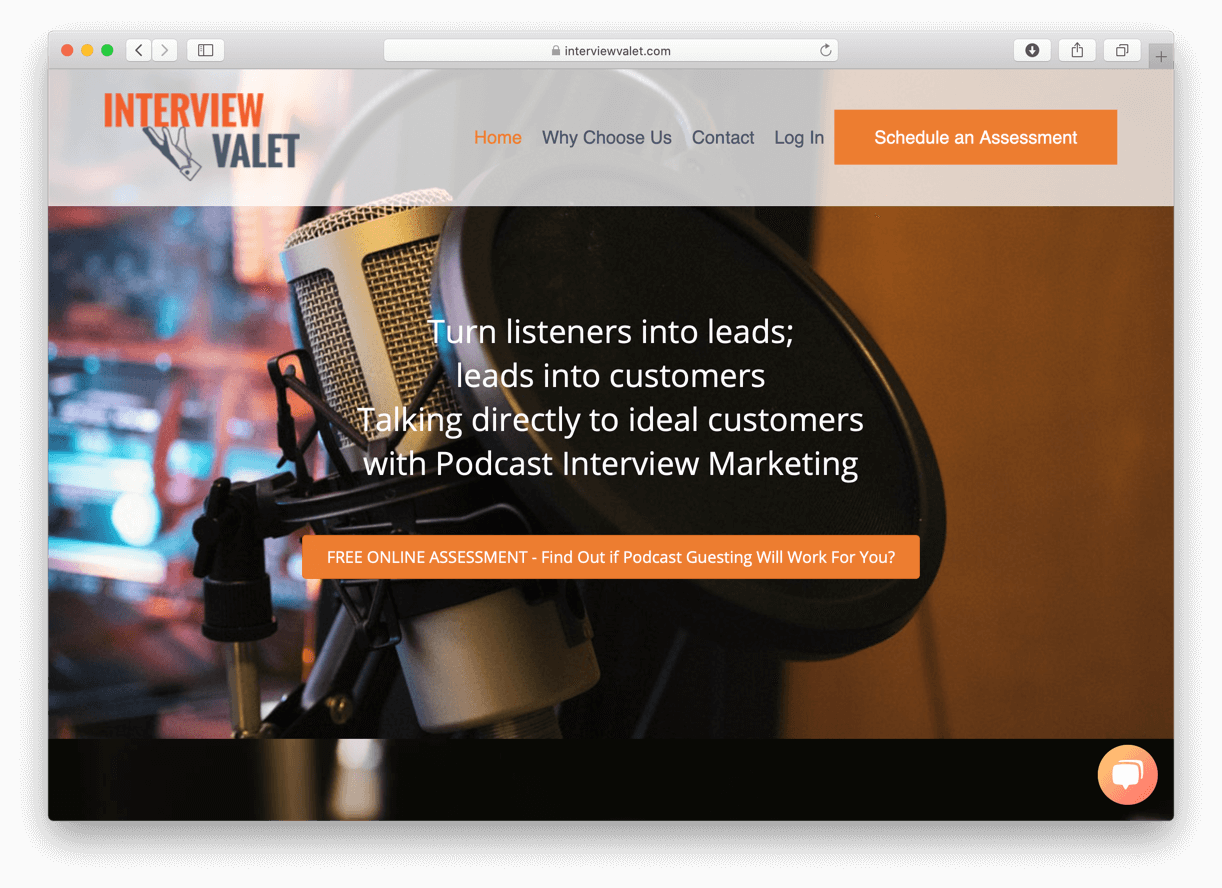
Cost: $750/month
Features:
- Personal booking agents who find the right podcasts for you & handle scheduling
- Social media promotion
- Ongoing coaching and strategy reviews to ensure results
5. PodMatch
PodMatch is a data-driven matching tool that uses A.I. to automatically connect you with podcasts. Once you create a guest profile, you'll get five free matches per week and unlimited messaging.
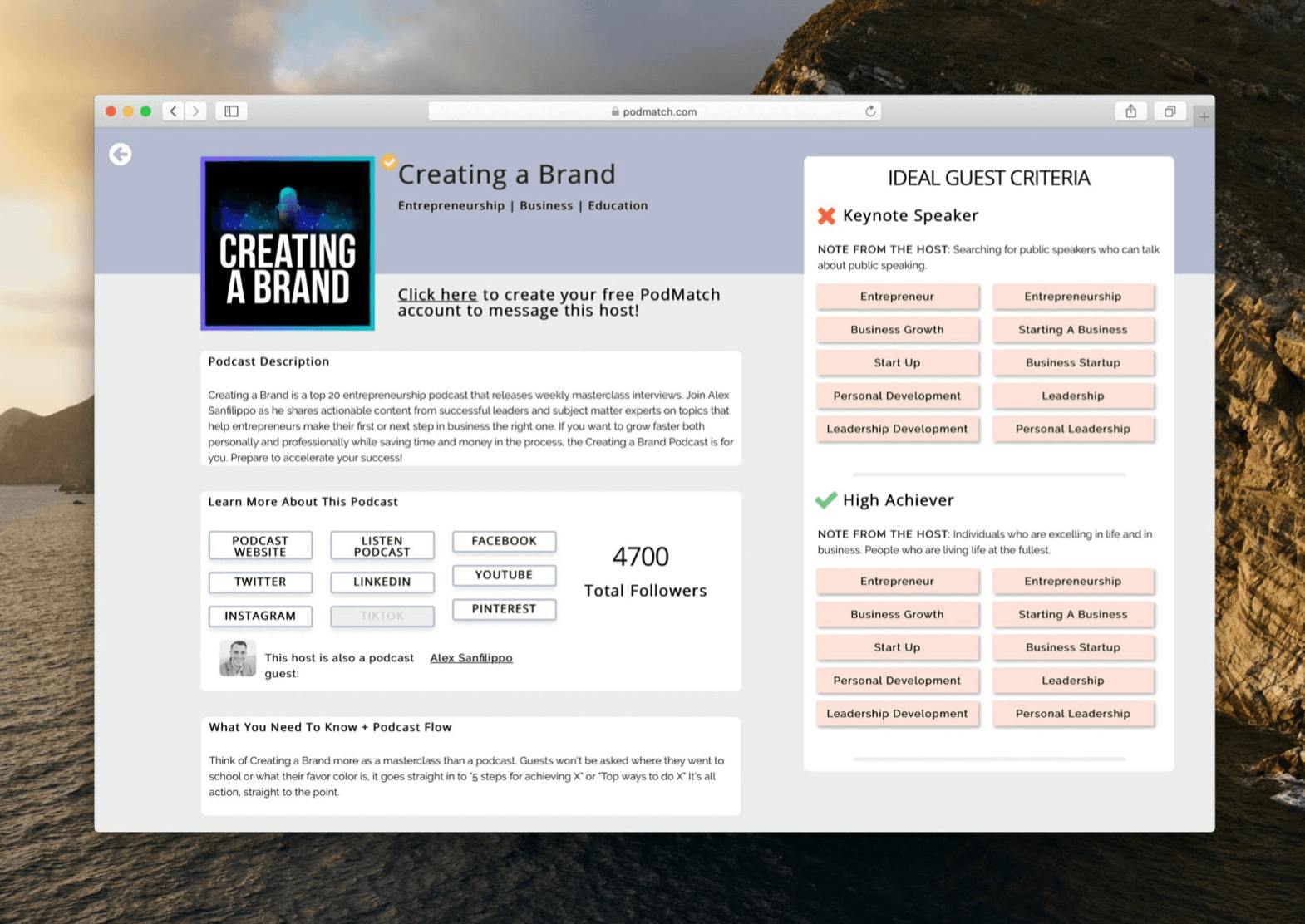
Cost: Free, with optional Pro plan upgrade for $34/month
Features:
- Public profile page for hosts to find and book you as a guest
- Automatic matching with ideal hosts and podcasts
- Message, book, and schedule interviews directly within PodMatch
Additional resources:
- Join the Buzzsprout Podcast Community Facebook page to connect with podcasters who are looking for guests on our weekly Find a Guest Wednesday post.